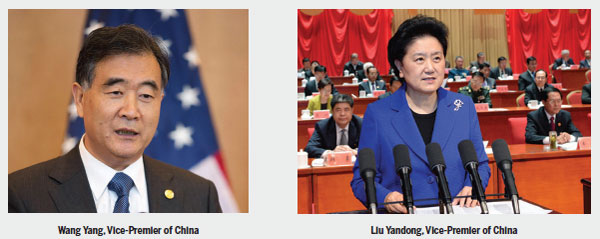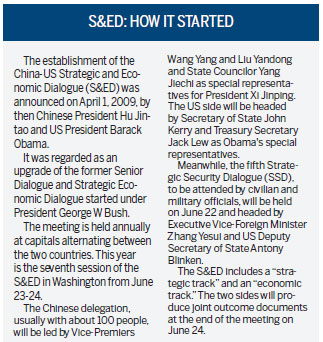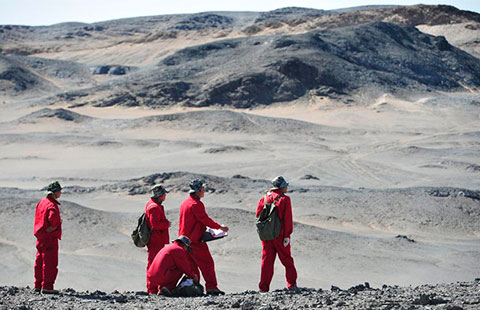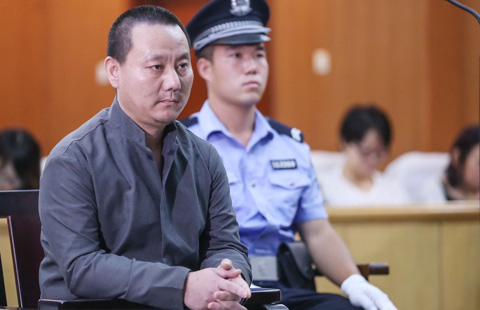More than 'greet' and 'meet'
Updated: 2015-06-19 11:21
By Chen Weihua(China Daily)
|
||||||||
Despite tensions over issues such as the South China Sea and cyber security, next week China and the United States will hold their largest annual bilateral meetings to expand cooperation and better manage differences, Chen Weihua reports from Washington.
T heir abbreviations are S&ED and CPE. To some observers of US-China relations, what they represent are simply annual "meet and greet opportunities".
But when they start next week in Washington, the sessions of the China-US Strategic and Economic Dialogue (S&ED) and the China-US High-Level Consultation on People-to-People Exchange (CPE) will take on added importance as a prelude to Chinese President Xi Jinping's meeting at the White House with President Barack Obama in September.
Vice-Premier Liu Yandong, China's highest-ranking female in the government, will lead her country's CPE delegation to the meetings by first spending three days engaging with Americans. She will be in Pittsburgh on Friday and then go to Houston, before heading to Washington for the largest annual bilateral meetings between the two governments.
In Pittsburgh, Liu is scheduled to meet Intel Corp CEO Brian Krzanich. The semiconductor chip maker has a major research facility in Pittsburgh and one in China. Liu and Krzanich had met in Beijing in October 2013.
She will attend an event marking the 10th "Chunhui Cup" Chinese Overseas Students Innovation and Entrepreneurship Competition, and meet Mayor William Peduto at city hall before going to the University of Pittsburgh for a meeting with Chancellor Patrick Gallagher and a tour of the school's Confucius Institute and medical school, where a group of Tsinghua University students is studying.
More than 270,000 Chinese students attend US universities and colleges, according to the Institute of International Education. In the fall of 2013, the University of Pittsburgh admitted 1,560 students from the Chinese mainland, compared with 123 from South Korea, 99 from Taiwan, and 95 from Saudi Arabia. A year ago, the University of Pittsburgh and Sichuan University launched a joint venture, Sichuan University Pittsburgh Institute in Chengdu in Southwest China.
Liu will then travel to Houston for the weekend and an array of cultural, sports, education and public health events.
On Tuesday, Liu, along with Vice-Premier Wang Yang and State Councilor Yang Jiechi, join US Secretary of State John Kerry and Treasury Secretary Jack Lew for what will be the seventh round of the S&ED and the sixth CPE. Kerry returned to Washington on Tuesday after surgery on his broken femur caused by a biking accident in France weeks ago. It is likely that he will arrive on crutches.
A medley
Unlike the CPE, which portrays largely a rosy picture of cooperation and exchange, the S&ED is more like a medley of cooperation, competition and sometimes confrontation.
Producing the biggest headlines between the two countries lately are lingering rows over maritime territorial disputes in the South China Sea, cyber security, the US rebalance to Asia strategy, US military surveillance close to Chinese shores, arms sales to Taiwan, US restrictions of high-tech exports to China and intellectual property rights.
Robert Daly, director of the Kissinger Institute on China and the United States at the Wilson Center, said the atmospherics going into this year's S&ED are "as bad as they've ever been", but he noted that both sides will likely use the S&ED to signal determination to continue cooperating with each other and will accentuate the mutual benefits of engagement.
During his visit last week to Washington, Central Military Commission Vice-Chairman Fan Changlong described his trip as creating a good atmosphere for the September visit by Xi, and said both sides are likely to use S&ED to further pave the way for a successful meeting between Xi and Obama.
And Nathan Sheets, the US undersecretary of the Treasury, said: "This year, the relationships and open communication developed in the S&ED will again play an important role in paving the way for the meeting of our presidents."
Cheng Li, director of the John L. Thornton China Center at the Brookings Institution, quoted Albert Einstein as saying in 1945 that "the release of atomic power has changed everything except our way of thinking." He wrote on the Brookings website on Wednesday that during the last 70 years, Einstein's statement has often reminded us to be critical of anachronistic worldviews in a profoundly changing world.
On the eve of the S&ED and in advance of Xi's trip, Li said policymakers in both countries should be less preoccupied by contentious issues, and more inspired by Einstein's call for a new way of thinking, noting the urgent need for cooperation between China and the US in an age of globalization and the need to establish international norms in cyber security.
Modest goal
Ted Carpenter, a senior fellow for defense and foreign policy studies at the Cato Institute, a Washington-based think tank, said this year's talks should focus on improving bilateral communication on key issues. "Such a modest goal is definitely achievable. It is not likely that the underlying substantive issues can be resolved quickly, since they are all rather complex, but measurable progress should be the goal," he said.
Carpenter believes that US and Chinese officials need to discuss how to reduce tension over the South China Sea, especially to prevent an incident between Chinese and US military forces operating in the area.
"The US side must also take greater steps to show that it is truly neutral regarding the substance of the various territorial disputes in the South China Sea," he said.
The Chinese believe that the US is biased against China in the maritime territorial disputes in both the East and South China Seas to keep its primacy in the region by rallying allies and partners, in particular Japan, the Philippines and Vietnam.
US officials, from Obama to Defense Secretary Ash Carter, have criticized China's recent land reclamations in the South China Sea, but Chinese officials, including Fan of the Central Military Commission, have argued that the construction is being done on China's sovereign territory and is mainly for civilian purpose such as disaster relief and navigation. They have dismissed the US concern by assuring that freedom of navigation will not be affected there for any nation.
China has been a latecomer in land reclamation in the South China Sea, something that Chinese officials said demonstrates China's restraint. US Assistant Secretary of Defense David Shear told a US Senate hearing in May that in the Nansha (Spratly) Islands, Vietnam has 48 outposts, the Philippines eight, China eight, Malaysia five and Taiwan one. China argued that some of these outposts were built on islets and reefs that belong to China.
On Tuesday, Lu Kang, the new foreign ministry spokesman who previously served as deputy chief of mission at the Chinese embassy in Washington, indicated that the land reclamation project on some stationed islands and reefs in the Nansha Islands will be completed in the coming days.
No miscalculation
During his visit to Washington last week, Fan urged the US to reduce its military activities in the air and waters of the South China Sea. Many Chinese believe that it was the US which emboldened countries such as the Philippines and Vietnam to adopt a more confrontational stance in the maritime territorial disputes there.
There has also been serious concern on both sides about a possible accident caused by misunderstanding and miscalculation when Chinese and US militaries operate in close proximity, especially following the 2001 collision of the US EP-3 spy plane and a fighter jet of the People's Liberation Army off China's Hainan Islands, causing the death of a Chinese pilot.
Fan and Carter promised last week that the two sides will strive to reach an agreement on a code of conduct regarding military encounters in the air-to-air annex by August, before Xi's visit to the US.
Fan and the Chinese government are still upset at the US Justice Department's indictment a year ago of five PLA officers for alleged cyber espionage, resulting in the suspension of a bilateral working group on cyber security set up about two years ago. They also have called it irresponsible for US officials to name China as the culprit for the recent hacking into the White House Office of Personnel Management before any serious investigation.
While the US has expressed concern over alleged Chinese cyber espionage regarding US corporate secrets, China said the US should reduce and stop its wide-ranging espionage against China as revealed by Edward Snowden, a former contractor for the National Security Agency (NSA).
China has argued that its guidelines for IT security equipment used in banks, which has raised eyebrows in the US in the past months, are for the sake of national security. Many Silicon Valley IT firms have been found to be willingly and unwillingly collaborating with the NSA, according to Snowden's revelations.
Schools of thoughts
There has been a lot of noise regarding how the US should react to the rise of China. In the report Revising the US Grand Strategy Toward China, Robert Blackwill of the Council on Foreign Relations and Ashley Tellis of the Carnegie Endowment for International Peace, argued for a tougher US stance.
"Because the American effort to 'integrate' China into the liberal international order has now generated new threats to US primacy in Asia - and could result in a consequential challenge to American power globally - Washington needs a new grand strategy toward China that centers on balancing the rise of Chinese power rather than continuing to assist its ascendancy," they wrote.
In a report released in April - US-China 21: The Future of US-China Relations under Xi Jinping - Kevin Rudd, the former Australian prime minister, argued that despite difficulties, the US-China relationship remains in decidedly positive territory.
Rudd, a fluent Mandarin speaker, said developing a common strategic narrative for US-China relations may be difficult, but it is certainly not impossible. And given the stakes involved for the future, it is increasingly necessary, he added.
While the US has accused China of trying to topple the current global governance system and China said it is only seeking to reform the system to reflect the new reality of emerging economies, Rudd said no one should assume that the current order cannot be radically improved.
"The uncomfortable truth is that our existing system of global governance, anchored in the United Nations (UN) and the Bretton Woods institutions, is becoming increasingly dysfunctional. We can see this in its cumbersome response to the great global security, economic, social and environmental challenges of our time," he wrote.
"For this reason, no one should assume, a priori, that a greater Chinese role in the order is by definition detrimental. That is simply not the case. The question is whether the unfolding dynamics in US-China relations will result in an international system that is better or worse than the present one, warts and all."
Cooperation has indeed been growing despite differences and sometime rivalry. China and US militaries have stepped up military-to-military exchanges and cooperation in the past two years, including more high-level visits and joint exercises.
The PLA Navy for the first time participated in the Rim of Pacific Exercise (RIMPAC) war games last year. And Fan last week invited Carter and Admiral Harry Harris, the new commander of the US Pacific Command, to visit China.
On the economic front, many Chinese still see the Trans-Pacific Partnership (TPP) as a US scheme to cut China out of the Asia supply chain, as argued by Columbia University Nobel laureate Joseph Stiglitz early this year. Some Chinese officials and pundits have expressed interest in understanding the TPP and weighing the pros and cons of a potential participation in the currently snagged trade negotiation among 12 countries.
Obama was dealt a major blow last Friday by Democrats in the House of Representatives when he tried to lobby for Trade Promotion Authority (TPA) that would allow the White House to fast-track trade talks, without which a conclusion of the negotiation looks impossible.
The US suffered a major setback two months ago trying to persuade its allies not to join the China-led Asia Infrastructure Investment Bank (AIIB), only to see allies from Asia to Europe, such as Britain, Australia and South Korea, joining the new bank as founding members. But US officials have since changed their rhetoric by welcoming the new institution, which the US is not considering joining now.
China has also drawn much attention with the launch of the Belt and Road Initiative, originally known as the land-based Silk Road Economic Belt and oceangoing Maritime Silk Road, aimed at developing connectivity and cooperation among countries, mostly developing nations. Such a move, while being warmly applauded by many, has been seen by some in the US as a threat to US influence.
Daly, of the Kissinger Institute, said the US should indicate that it welcomes a constructive Chinese role in shaping the international environment and providing international public goods.
"It could do this by expressing support for the 'One Belt One Road' initiative, provided that the program is carried out in a transparent manner, with input from civil society groups in participating countries, and with respect for environmental impacts and labor and human rights," he said.
In meeting Fan last week, US National Security Advisor Susan Rice expressed that the US is paying great attention to communication and coordination with China on global issues such as Iran's nuclear program, counter-terrorism, climate change and the fight against deadly Ebola.
After receiving much praise for the climate deal reached last November during Obama's visit in Beijing, many hope both China and the US will continue to show leadership during the S&ED and the days leading to the UN Climate Change Conference in Paris late this year, when a legally binding and universal agreement on climate is expected for all nations.
Progress of BIT
Key on this year's S&ED agenda will also be the Bilateral Investment Treaty (BIT), which concluded its 19th round of negotiations in Beijing last week.
In an April speech in Washington, Sheets, the Treasury undersecretary, dismissed the characterization of the BIT talks as slow. He cited the broad and far-reaching content being discussed and expressed optimism about making meaningful progress in a relatively short period of time.
The US is China's top trade partner with bilateral trade exceeding $550 billion in 2014, while China trails Canada as the second-largest trade partner for the US.
Many believe the BIT will unlock huge new opportunities for bilateral investment and trade. The US hopes China would further open up its service sector to foreign investment, and the Chinese want the US to treat the growing number of Chinese investors in the US in a fair manner and not use national security as an excuse to block their entry into the country. Investment by Chinese telecom equipment giant Huawei Technology has hit that roadblock many times with US elected officials describing the company as a possible national security concern.
A report released in May by the Rhodium Group and the National Committee on US-China Relations showed that Chinese companies are operating in 340 of the 435 US congressional districts, employing more than 80,000 Americans.
Contact the writer at chenweihua@chinadailyusa.com

|
Chinese Vice-Premier Wang Yang and State Councilor Yang Jiechi will co-chair the 7th China-US Strategic and Economic Dialogue on June 23-24 in Washington with US Secretary of State John Kerry and Treasury Secretary Jack Lew. Meanwhile, Chinese Vice-Premier Liu Yandong will co-chair the 6th China-US High-Level Consultation on People-to-People Exchange with US Secretary of State John Kerry on June 23. |

(China Daily 06/19/2015 page2)

 Painter uses butterfly wings as canvases
Painter uses butterfly wings as canvases
 Finding the minerals in the wild
Finding the minerals in the wild
 Ten photos you don't wanna miss
Ten photos you don't wanna miss
 Fish enjoy Dragon Boat Festival zongzi
Fish enjoy Dragon Boat Festival zongzi
 Ten photos you don't wanna miss – June 18
Ten photos you don't wanna miss – June 18
 Man with 15 girlfriends charged with fraud
Man with 15 girlfriends charged with fraud
 Heavy rain, flood hit many parts of China
Heavy rain, flood hit many parts of China
 Muslims around the world mark first eve of holy month
Muslims around the world mark first eve of holy month
Most Viewed
Editor's Picks

|

|

|

|

|

|
Today's Top News
Obama suggests more gun control after shooting
Talks seen as prelude to visit by President Xi to US in September
The most costly cities for expats
House passes fast-track trade bill
Gunman kills nine people in South Carolina church shooting
US House moves to revive Obama's Pacific trade pact
Hong Kong lawmakers reject election reform proposal
Lies and false hopes entrap Xinjiangers
US Weekly

|

|
